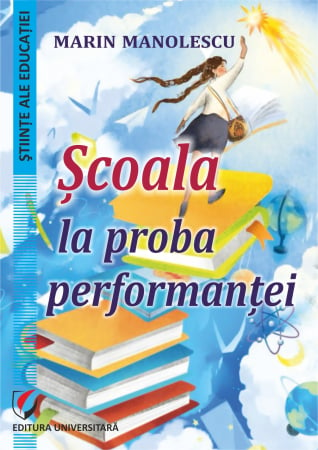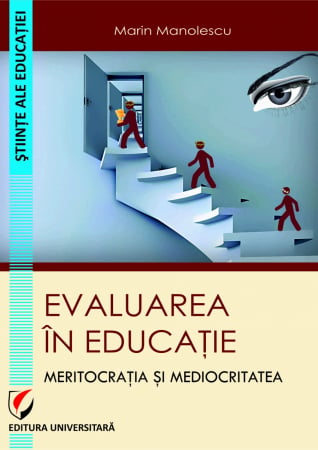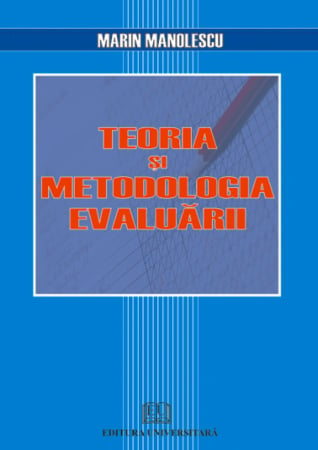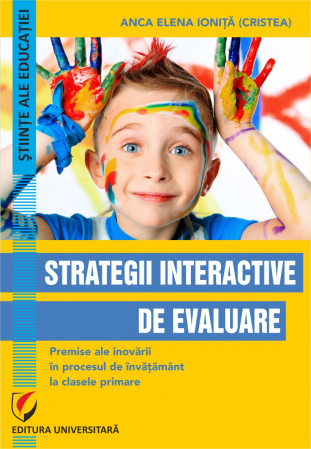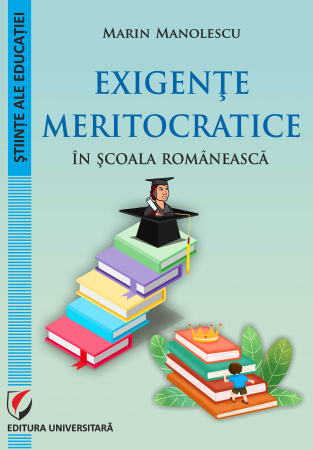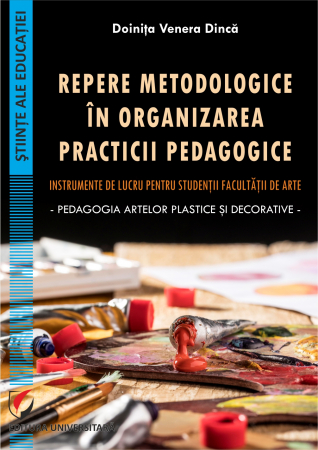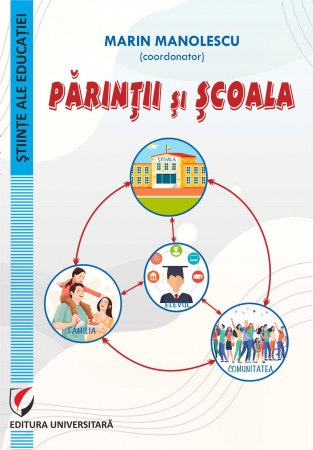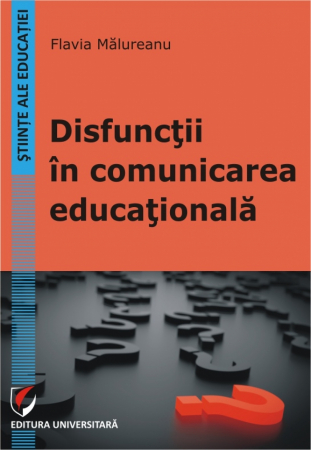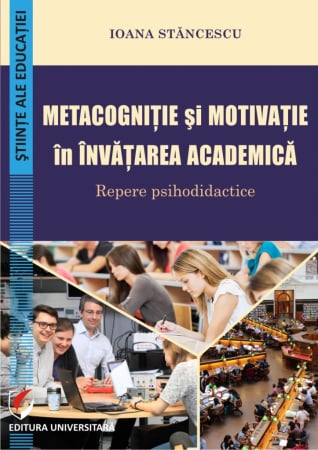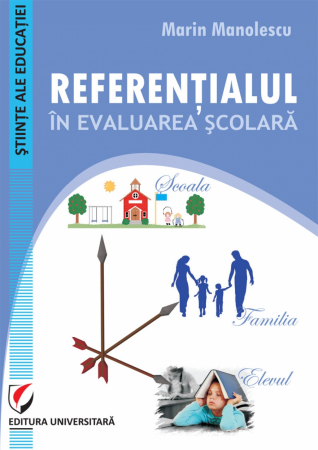Manuscript proposals: [email protected] / 0745 204 115 //// Tracking orders Individuals / Sales: 0745 200 357 / Orders Legal entities: 0721 722 783
ISBN: 978-606-28-1351-2
DOI: https://doi.org/10.5682/9786062813512
Publisher year: 2021
Edition: I
Pages: 256
Publisher: Editura Universitară
Author: Mihaela Stanciu
Product Code:
9786062813512
Do you need help?
0745 200 357
- Description
- Download (1)
- Authors
- Content
- More details
- Reviews (0)
"The paper proposed by Mrs. Mihaela Stanciu has the merit of reconsidering, re-evaluating and contextualizing the status of interdisciplinarity in the efficiency of this perspective through a demonstration based on a research that includes both ascertaining and projective reports, with notes of action research, methodological development, educational intervention. "
Prof. univ. Dr. Constantin Cucos,
Faculty of Psychology and Educational Sciences,
University "l. I. Cuza" Iasi
"I am convinced that this work can become a real impetus for young actors and pedagogues in choosing classical literary texts to be worked with students in theater classes, useful even for teachers who teach literature, as well as artistic activities in pre-university education. "
Prof. univ. Dr. Bogdana Darie Cretu,
"I. L. Caragiale" National University of Theater and Cinematography Bucharest
Prof. univ. Dr. Constantin Cucos,
Faculty of Psychology and Educational Sciences,
University "l. I. Cuza" Iasi
"I am convinced that this work can become a real impetus for young actors and pedagogues in choosing classical literary texts to be worked with students in theater classes, useful even for teachers who teach literature, as well as artistic activities in pre-university education. "
Prof. univ. Dr. Bogdana Darie Cretu,
"I. L. Caragiale" National University of Theater and Cinematography Bucharest
-
Interdisciplinary teaching strategies used to motivate students in the literature lesson
Download
MIHAELA STANCIU
Summary / 7
Abstract / 12
Contents / 16
List of tables / 19
List of figures / 22
Introduction to the field / 23
Chapter I. Theoretical foundations. Epistemological, didactic and interdisciplinary concepts / 28
Interdisciplinarity. Conceptual clarifications / 28
Vocational training and interdisciplinarity / 30
1.3 Teaching strategies / 33
1.3.1 The concept of strategy / 33
1.3.2 Interdisciplinary teaching strategies. Operationalization / 35
1.4 Theories and models of motivation. Extrinsic motivation and intrinsic motivation / 51
1.4.1 The humanist approach. C. Rogers / 52
1.4.2 Behaviorist approach. B. F. Skinner / 53
1.4.3 Socio-cognitive approach. R. Viau / 54
Chapter II. Research methodology in interdisciplinary didactics of literature / 57
2.1 The identity of our interdisciplinary research. Symbiotic values between research ‑ development and research ‑ action / 57
2.2 Questions, purpose and objectives of the research project / 58
2.3 Research variables and working hypotheses in topic research / 60
2.3. Research variables / 60
2.3.2 Research hypotheses / 61
2.4 Research sample. Features / 62
2.5 Research methods, techniques and tools / 71
2.5.1 Case study. Operational variant / 71
2.5.2 Research methods, techniques and tools in the case study "Theatrical art in the literature lesson" / 74
2.5.2.1 Data collection: observation, semi-conducted interview, questionnaire-based survey / 74
2.5.2.2 Qualitative and quantitative analysis of the corpus. Research tools / 87
2.5.2.3 Methods of statistical analysis / 98
2.5.3 Research methods, techniques and tools in the case study "Mentimeter and literature lesson" / 99
2.5.3.1 Data collection: observation, semi-conducted interview, questionnaire-based survey / 99
2.5.3.2 Qualitative and quantitative analysis of the corpus. Research tools / 102
2.5.3.3 Methods of statistical analysis / 106
2.5.4 Research methods, techniques and tools in the case study "Experiential versus Digital" / 106
2.5.4.1 Data collection: observation, scenario technique, survey based on questionnaire / 106
2.5.4.2 Qualitative and quantitative analysis of the corpus. Research tools / 113
2.5.4.3 Methods of statistical analysis / 132
Chapter III. Results, interpretations, comments / 134
3.1. Research results - case study "Theatrical art in the literature lesson" / 134
3.1.1 Analysis of theatrical practices / 134
3.1.1.1 A didactic project - application of Interdisciplinary professional (self) training. Operational outline / 139
3.1.1.2 Interdisciplinary teaching strategies. Investigation and construction / 149
3.1.1.3 The pedagogical scenario technique / 154
3.1.2 Measuring students' learning motivation / 172
3.1.3 The teacher's perception regarding the use of interdisciplinary teaching strategies through the use of theatrical art / 179
3.2 Research results - case study "Mentimeter in the lesson of Romanian language and literature" / 193
3.2.1 Analysis of school practices. Mentimeter response system / 193
3.2.2 Measuring students' learning motivation / 197
3.2.3 The teacher's perception regarding the use of an interdisciplinary teaching strategy with technological application resource / 203
3.3 Research results - case study "Experiential versus Digital" / 204
3.3.1 Teacher training and pedagogical practices in the field of didactics of philological disciplines / 204
3.3.2 Teachers' perception regarding the use of applied interdisciplinary teaching strategies / 212
3.3.3 Measuring the motivation to learn of middle and high school students, urban and rural level / 218
Chapter IV. A continuous reconstruction of the theory and practices in the classroom / 234
4.1 The values added by the research - case study “The art of theater in the literature lesson” / 234
4.2 Values added by the research ‑case study “Mentimeter technique in language and literature lesson” / 236
4.3 The values added by the research decase study “Experiential versus Digital” / 237
Bibliography / 244
Abstract / 12
Contents / 16
List of tables / 19
List of figures / 22
Introduction to the field / 23
Chapter I. Theoretical foundations. Epistemological, didactic and interdisciplinary concepts / 28
Interdisciplinarity. Conceptual clarifications / 28
Vocational training and interdisciplinarity / 30
1.3 Teaching strategies / 33
1.3.1 The concept of strategy / 33
1.3.2 Interdisciplinary teaching strategies. Operationalization / 35
1.4 Theories and models of motivation. Extrinsic motivation and intrinsic motivation / 51
1.4.1 The humanist approach. C. Rogers / 52
1.4.2 Behaviorist approach. B. F. Skinner / 53
1.4.3 Socio-cognitive approach. R. Viau / 54
Chapter II. Research methodology in interdisciplinary didactics of literature / 57
2.1 The identity of our interdisciplinary research. Symbiotic values between research ‑ development and research ‑ action / 57
2.2 Questions, purpose and objectives of the research project / 58
2.3 Research variables and working hypotheses in topic research / 60
2.3. Research variables / 60
2.3.2 Research hypotheses / 61
2.4 Research sample. Features / 62
2.5 Research methods, techniques and tools / 71
2.5.1 Case study. Operational variant / 71
2.5.2 Research methods, techniques and tools in the case study "Theatrical art in the literature lesson" / 74
2.5.2.1 Data collection: observation, semi-conducted interview, questionnaire-based survey / 74
2.5.2.2 Qualitative and quantitative analysis of the corpus. Research tools / 87
2.5.2.3 Methods of statistical analysis / 98
2.5.3 Research methods, techniques and tools in the case study "Mentimeter and literature lesson" / 99
2.5.3.1 Data collection: observation, semi-conducted interview, questionnaire-based survey / 99
2.5.3.2 Qualitative and quantitative analysis of the corpus. Research tools / 102
2.5.3.3 Methods of statistical analysis / 106
2.5.4 Research methods, techniques and tools in the case study "Experiential versus Digital" / 106
2.5.4.1 Data collection: observation, scenario technique, survey based on questionnaire / 106
2.5.4.2 Qualitative and quantitative analysis of the corpus. Research tools / 113
2.5.4.3 Methods of statistical analysis / 132
Chapter III. Results, interpretations, comments / 134
3.1. Research results - case study "Theatrical art in the literature lesson" / 134
3.1.1 Analysis of theatrical practices / 134
3.1.1.1 A didactic project - application of Interdisciplinary professional (self) training. Operational outline / 139
3.1.1.2 Interdisciplinary teaching strategies. Investigation and construction / 149
3.1.1.3 The pedagogical scenario technique / 154
3.1.2 Measuring students' learning motivation / 172
3.1.3 The teacher's perception regarding the use of interdisciplinary teaching strategies through the use of theatrical art / 179
3.2 Research results - case study "Mentimeter in the lesson of Romanian language and literature" / 193
3.2.1 Analysis of school practices. Mentimeter response system / 193
3.2.2 Measuring students' learning motivation / 197
3.2.3 The teacher's perception regarding the use of an interdisciplinary teaching strategy with technological application resource / 203
3.3 Research results - case study "Experiential versus Digital" / 204
3.3.1 Teacher training and pedagogical practices in the field of didactics of philological disciplines / 204
3.3.2 Teachers' perception regarding the use of applied interdisciplinary teaching strategies / 212
3.3.3 Measuring the motivation to learn of middle and high school students, urban and rural level / 218
Chapter IV. A continuous reconstruction of the theory and practices in the classroom / 234
4.1 The values added by the research - case study “The art of theater in the literature lesson” / 234
4.2 Values added by the research ‑case study “Mentimeter technique in language and literature lesson” / 236
4.3 The values added by the research decase study “Experiential versus Digital” / 237
Bibliography / 244
The use of interdisciplinary teaching strategies, in order to stimulate students 'motivation in the study of literature, is the subject of my research, in the context of research in Education Sciences that contribute to identifying pedagogical activities, decisive in students' cognitive commitment and perseverance in a task. work (Viau, 2014).
The great changes that characterize the society of the 21st century, such as digitalization and globalization, require literature teachers to rethink its methods and practices, in order to meet the real needs of students: to be prepared to live in tomorrow's world. This situation requires a re-debate of teaching strategies, especially since teachers and surveys in the field of reading often invoke a low motivation of students. Moreover, the results of PISA (2015) place Romania on the 50th place out of 65, highlighting that almost 40% of Romanian students have difficulties in reading and understanding a text.
It can be said that motivation is an "objective" goal "in education, because it conditions learning. That is why it is important to understand what stimulates success and perseverance in the study of a discipline, in order to provide students with good teaching and learning conditions (Sauve, 2007).
This paper is organized into four chapters.
The chapter “Theoretical foundations. Epistemological, didactic and interdisciplinary concepts” is dedicated to conceptual clarifications around three nuclei: interdisciplinarity, didactic strategies and motivation. At the same time, it points out some research whose purpose is to present an adequate continuous training in the field of interdisciplinarity. It is an approach that is also associated with our research, which followed the strategies of implementing an interdisciplinary professional (self) training in order to train the competence to design and apply in language and literature lessons interdisciplinary teaching strategies, with a role in increasing the motivation of students, middle school and high school. This analysis allowed us to draw the guidelines of our research in the field of professional training, identifying as relevant some training models and procedures for carrying out interdisciplinarity. Along with the model of the reflective practitioner (Schon, 1983), we noted the need to develop professional skills of future teachers on three levels: curricular, didactic and pedagogical also considered essential to operationalize their own interdisciplinary training strategy. The partnership with teachers proposed by Fazenda (2007) reveals a training strategy that we also used in our own research and training. Last but not least, we mention Fourez (1992) who proposes as a methodical strategy the construction of an island of rationality.
The two interdisciplinary teaching strategies, portrayed in our research, are synthesized into three elements that circumscribe the theoretical conception of each island of rationality. The interdisciplinary didactic strategy, with a role in stimulating the students' motivation, which we called ‑ a theatrical games strategy derives from the panorama of an island of interdisciplinarity, born at the intersection of experiential learning pedagogy (Dewey, 1972; Kolb, 1984) with the field of theatrical pedagogy (Spolin, 2008) and that of literature teaching. The second interdisciplinary teaching strategy, with a role in stimulating students' motivation, which we called ‑ a digital inspiration strategy, describes the panorama of an island of interdisciplinarity emerging from three fields: (neo) behaviorist psychology, elements of information and communication technology, as well as and elements of didactics of literature, related to computer learning.
Regarding the measurement of motivation with the help of research tools, we mainly considered the Viau model (2014), which we found most relevant to describe the motivational dynamics of students, because it has as a starting point the pedagogical activities proposed by the professor, this being a central dimension of our research. This model presents three types of perceptions that can exert an influence on motivational dynamics: the student's perception of the value of the activity; the student's perception of his competence; the student's perception about the controllability of the activity. In addition, other motivational sources highlighted in the design of indicators of research tools were the importance of the teacher-student relationship, the existence of a positive relational context, the possibility of freedom to learn, from a humanist or Rogerian perspective, on the one hand; precise definition of objectives, giving positive feedback, the presence of tangible stimuli, from a behaviorist perspective, on the other hand. In view of these identified indicators, we have developed the following research tools:
1. the questionnaire addressed to the students, regarding the opinion about the traditional ‑ disciplinary methods;
2. the questionnaire addressed to the students, regarding the opinion about the experiential methods of theatrical inspiration;
3. the questionnaire addressed to the students, regarding the opinion about the digital technique Mentimeter;
4. student behavior observation sheet;
5. theatrical games analysis grid;
6. the analysis grid of an interdisciplinary didactic strategy.
The second chapter describes, as the title shows, the research methodology in interdisciplinary didactics of literature, both qualitatively and quantitatively. This research, which is an action research that encompasses research and development, is not limited to the development of a "pedagogical product" (Van der Maren, 2003) embodied in a set of interdisciplinary teaching strategies for the curricular area Language and communication, but and to its testing by quasi-experimental subjects. This option for an intertwined research approach was associated with the following case studies: "Theatrical art in the literature lesson", "Mentimeter in the language and literature lesson", "Experiential versus Digital", which took place during the three years of research.
The overall goal of the research project is to improve the practice by adding newly created values in terms of teaching quality. The particular aim of the project is to investigate the perception of teachers, from the curricular area Language and communication, regarding the use of interdisciplinary teaching strategies in the lesson, and the optimization of teaching methods.
The specific research questions, to which the quasi-experimental pedagogical approach tried to answer, define two centers of interest:
a. students' motivation
(i) To what extent does the use of SDIs, in learning situations specific to the literature lesson, influence students' motivation, compared to traditional ‑ disciplinary manners?
(ii) Which of the methods used in building interdisciplinary teaching strategies, experiential methods versus digital methods and techniques, contribute more to increasing students' motivation and involvement in the lesson, according to their level of study (middle school or high school)?
b. teaching and how to teach
(iii) How is the pedagogical practice of teachers influenced by their professional identity?
The general hypothesis formulates, in fact, an answer to the research questions, which is waiting to be confirmed: a greater degree of involvement and motivation on the part of the students in the study of the Romanian language and literature discipline, as well as the increase of their reading competence ”.
Each case study favors as methods of data collection observation, semi-directed interview, questionnaire-based survey, followed by a qualitative and quantitative analysis. The data collected through the questionnaire also explore students' motivation from a statistical perspective, by applying the Cronbach Alpha internal consistency coefficient and the Student's T test, which in turn includes the Shapiro ‑ Wilk multivariate normality test and descriptive statistics.
The results of the first case study, "Theatrical art in the literature lesson" refer, first, to the identification of plays and theatrical techniques (a total of 12), which were renamed, adapted and described as experiential methods, with applicability in the language lesson and Roman literature; the second result of the research is a mini ‑ interdisciplinary self-training application project for teachers, which includes two interdisciplinary didactic models for teaching literature: the EEE model (play experience - reading experience - experimentation) and the IRR model (question - reflection ‑ answer) . Regarding the measurement of students' motivation, both qualitative and statistical analyzes show that students show a higher level of motivation after applying experiential methods, compared to traditional teaching methods. The average level of motivation increases significantly in the case of experiential methods, showing a difference of 3.59 between the two (experiential method = 34.24, respectively traditional method = 30.65). The last result of the first case study shows the pedagogical contributions of the 12 games and theatrical techniques, according to the application of an analysis grid of interdisciplinary didactic strategies. Research results - case study "Mentimeter in literature lesson" shows that students show a higher level of motivation due to the application of digital techniques compared to the traditional method of teaching literature lesson, both in high school and high school . The teacher's perception regarding the use of the digital Mentimeter technique in the literature lesson is favorable and reveals numerous pedagogical contributions. The results in the research - case study "Experiential versus Digital" highlight, in the current pedagogical practice in France, the existence in the school, at gymnasium level, of some classes with cognitive profile (cogni classes), led by teachers who benefit from an adequate training . Thus, the field of didactics of French literature is under the sign of research in cognitive neuroscience, in order to identify a mental model of learning, which promotes attention, memory, active commitment, consolidation and allows students to understand more easily, to engage more and to retain better ‑ throughout life. This path between the philosophy of studies in neuroscience and classroom practice must be taken individually by practicing teachers, called for a voluntary research of national scope, in order to find solutions for implementation. In this context, the following result of our research appears. The two proposed interdisciplinary strategies, connected with the EEE and IRR teaching models, contribute to the development of attention, memory, the ability to listen actively, also favor the competence of public speaking (in the case of EEE) and the ability to to work in a team, as it results from the analysis grid of an interdisciplinary didactic strategy. Regarding the measurement of students' motivation, which takes into account the variables theatrical games, respectively the digital technique Mentimeter, the data collected and analyzed from a qualitative and statistical point of view lead to results that highlight an increase in motivation for both types of methods. with traditional-disciplinary methods. The perception of teachers in the national and French space, the curricular area Language and communication, validates the general research hypothesis, registering a positive correlation between the training of skills in performing arts and digital techniques and the possibility of applying interdisciplinary teaching strategies based on experiential methods and applications. ‑Learning.
My research also has some important limitations, many being caused especially by the health crisis, which suddenly interrupted the two internship conventions in the two French educational institutions, depriving me of the possibility of collecting complete data from students. The same thing happened with some of the students included in the research in the national space, who could no longer be investigated. School equipment remains an extremely important issue in digital applications, as has happened in rural schools (for example, in the case of applying the Mentimeter technique, the lack of internet connection has been found). The time variable has a considerable influence. in the design of experiential learning situations or the use of the Mentimeter response system, both requiring a considerable volume of time and a greater effort on the part of the teacher, the consequence being the reduction of the number of professors participating in the research.
Recalling a Latin aphorism Ex uno omni aspecta / Starting from a case, we understand everything (Dumez, 2013), we conclude that this thesis brings results with methodological and pragmatic answers to the questions of the teacher-researcher in the teaching of philological disciplines. A finality of these case studies is the proposal of a pedagogical product (interdisciplinary didactic strategies) within an application project of interdisciplinary professional training, in pre-university, with effects on stimulating students' motivation for reading / literature and, consequently, of better school performance. good.
The great changes that characterize the society of the 21st century, such as digitalization and globalization, require literature teachers to rethink its methods and practices, in order to meet the real needs of students: to be prepared to live in tomorrow's world. This situation requires a re-debate of teaching strategies, especially since teachers and surveys in the field of reading often invoke a low motivation of students. Moreover, the results of PISA (2015) place Romania on the 50th place out of 65, highlighting that almost 40% of Romanian students have difficulties in reading and understanding a text.
It can be said that motivation is an "objective" goal "in education, because it conditions learning. That is why it is important to understand what stimulates success and perseverance in the study of a discipline, in order to provide students with good teaching and learning conditions (Sauve, 2007).
This paper is organized into four chapters.
The chapter “Theoretical foundations. Epistemological, didactic and interdisciplinary concepts” is dedicated to conceptual clarifications around three nuclei: interdisciplinarity, didactic strategies and motivation. At the same time, it points out some research whose purpose is to present an adequate continuous training in the field of interdisciplinarity. It is an approach that is also associated with our research, which followed the strategies of implementing an interdisciplinary professional (self) training in order to train the competence to design and apply in language and literature lessons interdisciplinary teaching strategies, with a role in increasing the motivation of students, middle school and high school. This analysis allowed us to draw the guidelines of our research in the field of professional training, identifying as relevant some training models and procedures for carrying out interdisciplinarity. Along with the model of the reflective practitioner (Schon, 1983), we noted the need to develop professional skills of future teachers on three levels: curricular, didactic and pedagogical also considered essential to operationalize their own interdisciplinary training strategy. The partnership with teachers proposed by Fazenda (2007) reveals a training strategy that we also used in our own research and training. Last but not least, we mention Fourez (1992) who proposes as a methodical strategy the construction of an island of rationality.
The two interdisciplinary teaching strategies, portrayed in our research, are synthesized into three elements that circumscribe the theoretical conception of each island of rationality. The interdisciplinary didactic strategy, with a role in stimulating the students' motivation, which we called ‑ a theatrical games strategy derives from the panorama of an island of interdisciplinarity, born at the intersection of experiential learning pedagogy (Dewey, 1972; Kolb, 1984) with the field of theatrical pedagogy (Spolin, 2008) and that of literature teaching. The second interdisciplinary teaching strategy, with a role in stimulating students' motivation, which we called ‑ a digital inspiration strategy, describes the panorama of an island of interdisciplinarity emerging from three fields: (neo) behaviorist psychology, elements of information and communication technology, as well as and elements of didactics of literature, related to computer learning.
Regarding the measurement of motivation with the help of research tools, we mainly considered the Viau model (2014), which we found most relevant to describe the motivational dynamics of students, because it has as a starting point the pedagogical activities proposed by the professor, this being a central dimension of our research. This model presents three types of perceptions that can exert an influence on motivational dynamics: the student's perception of the value of the activity; the student's perception of his competence; the student's perception about the controllability of the activity. In addition, other motivational sources highlighted in the design of indicators of research tools were the importance of the teacher-student relationship, the existence of a positive relational context, the possibility of freedom to learn, from a humanist or Rogerian perspective, on the one hand; precise definition of objectives, giving positive feedback, the presence of tangible stimuli, from a behaviorist perspective, on the other hand. In view of these identified indicators, we have developed the following research tools:
1. the questionnaire addressed to the students, regarding the opinion about the traditional ‑ disciplinary methods;
2. the questionnaire addressed to the students, regarding the opinion about the experiential methods of theatrical inspiration;
3. the questionnaire addressed to the students, regarding the opinion about the digital technique Mentimeter;
4. student behavior observation sheet;
5. theatrical games analysis grid;
6. the analysis grid of an interdisciplinary didactic strategy.
The second chapter describes, as the title shows, the research methodology in interdisciplinary didactics of literature, both qualitatively and quantitatively. This research, which is an action research that encompasses research and development, is not limited to the development of a "pedagogical product" (Van der Maren, 2003) embodied in a set of interdisciplinary teaching strategies for the curricular area Language and communication, but and to its testing by quasi-experimental subjects. This option for an intertwined research approach was associated with the following case studies: "Theatrical art in the literature lesson", "Mentimeter in the language and literature lesson", "Experiential versus Digital", which took place during the three years of research.
The overall goal of the research project is to improve the practice by adding newly created values in terms of teaching quality. The particular aim of the project is to investigate the perception of teachers, from the curricular area Language and communication, regarding the use of interdisciplinary teaching strategies in the lesson, and the optimization of teaching methods.
The specific research questions, to which the quasi-experimental pedagogical approach tried to answer, define two centers of interest:
a. students' motivation
(i) To what extent does the use of SDIs, in learning situations specific to the literature lesson, influence students' motivation, compared to traditional ‑ disciplinary manners?
(ii) Which of the methods used in building interdisciplinary teaching strategies, experiential methods versus digital methods and techniques, contribute more to increasing students' motivation and involvement in the lesson, according to their level of study (middle school or high school)?
b. teaching and how to teach
(iii) How is the pedagogical practice of teachers influenced by their professional identity?
The general hypothesis formulates, in fact, an answer to the research questions, which is waiting to be confirmed: a greater degree of involvement and motivation on the part of the students in the study of the Romanian language and literature discipline, as well as the increase of their reading competence ”.
Each case study favors as methods of data collection observation, semi-directed interview, questionnaire-based survey, followed by a qualitative and quantitative analysis. The data collected through the questionnaire also explore students' motivation from a statistical perspective, by applying the Cronbach Alpha internal consistency coefficient and the Student's T test, which in turn includes the Shapiro ‑ Wilk multivariate normality test and descriptive statistics.
The results of the first case study, "Theatrical art in the literature lesson" refer, first, to the identification of plays and theatrical techniques (a total of 12), which were renamed, adapted and described as experiential methods, with applicability in the language lesson and Roman literature; the second result of the research is a mini ‑ interdisciplinary self-training application project for teachers, which includes two interdisciplinary didactic models for teaching literature: the EEE model (play experience - reading experience - experimentation) and the IRR model (question - reflection ‑ answer) . Regarding the measurement of students' motivation, both qualitative and statistical analyzes show that students show a higher level of motivation after applying experiential methods, compared to traditional teaching methods. The average level of motivation increases significantly in the case of experiential methods, showing a difference of 3.59 between the two (experiential method = 34.24, respectively traditional method = 30.65). The last result of the first case study shows the pedagogical contributions of the 12 games and theatrical techniques, according to the application of an analysis grid of interdisciplinary didactic strategies. Research results - case study "Mentimeter in literature lesson" shows that students show a higher level of motivation due to the application of digital techniques compared to the traditional method of teaching literature lesson, both in high school and high school . The teacher's perception regarding the use of the digital Mentimeter technique in the literature lesson is favorable and reveals numerous pedagogical contributions. The results in the research - case study "Experiential versus Digital" highlight, in the current pedagogical practice in France, the existence in the school, at gymnasium level, of some classes with cognitive profile (cogni classes), led by teachers who benefit from an adequate training . Thus, the field of didactics of French literature is under the sign of research in cognitive neuroscience, in order to identify a mental model of learning, which promotes attention, memory, active commitment, consolidation and allows students to understand more easily, to engage more and to retain better ‑ throughout life. This path between the philosophy of studies in neuroscience and classroom practice must be taken individually by practicing teachers, called for a voluntary research of national scope, in order to find solutions for implementation. In this context, the following result of our research appears. The two proposed interdisciplinary strategies, connected with the EEE and IRR teaching models, contribute to the development of attention, memory, the ability to listen actively, also favor the competence of public speaking (in the case of EEE) and the ability to to work in a team, as it results from the analysis grid of an interdisciplinary didactic strategy. Regarding the measurement of students' motivation, which takes into account the variables theatrical games, respectively the digital technique Mentimeter, the data collected and analyzed from a qualitative and statistical point of view lead to results that highlight an increase in motivation for both types of methods. with traditional-disciplinary methods. The perception of teachers in the national and French space, the curricular area Language and communication, validates the general research hypothesis, registering a positive correlation between the training of skills in performing arts and digital techniques and the possibility of applying interdisciplinary teaching strategies based on experiential methods and applications. ‑Learning.
My research also has some important limitations, many being caused especially by the health crisis, which suddenly interrupted the two internship conventions in the two French educational institutions, depriving me of the possibility of collecting complete data from students. The same thing happened with some of the students included in the research in the national space, who could no longer be investigated. School equipment remains an extremely important issue in digital applications, as has happened in rural schools (for example, in the case of applying the Mentimeter technique, the lack of internet connection has been found). The time variable has a considerable influence. in the design of experiential learning situations or the use of the Mentimeter response system, both requiring a considerable volume of time and a greater effort on the part of the teacher, the consequence being the reduction of the number of professors participating in the research.
Recalling a Latin aphorism Ex uno omni aspecta / Starting from a case, we understand everything (Dumez, 2013), we conclude that this thesis brings results with methodological and pragmatic answers to the questions of the teacher-researcher in the teaching of philological disciplines. A finality of these case studies is the proposal of a pedagogical product (interdisciplinary didactic strategies) within an application project of interdisciplinary professional training, in pre-university, with effects on stimulating students' motivation for reading / literature and, consequently, of better school performance. good.
If you want to express your opinion about this product you can add a review.
write a review

6359.png)
![Interdisciplinary teaching strategies used to motivate students in the literature lesson [1] Interdisciplinary teaching strategies used to motivate students in the literature lesson [1]](https://gomagcdn.ro/domains/editurauniversitara.ro/files/product/large/stanciu-mihaela_strategii-didactice_bt-3427-5757.jpg)
